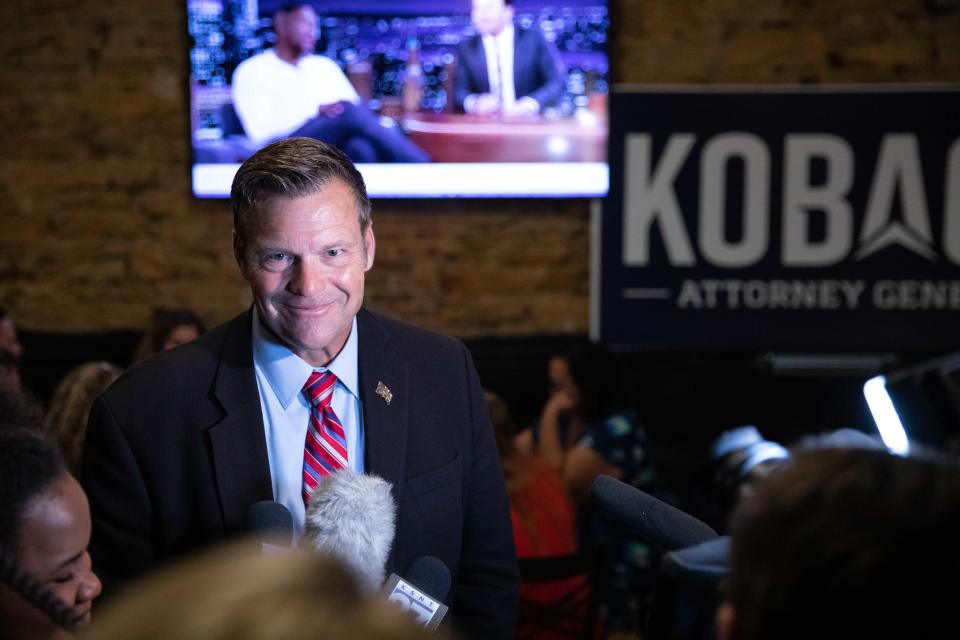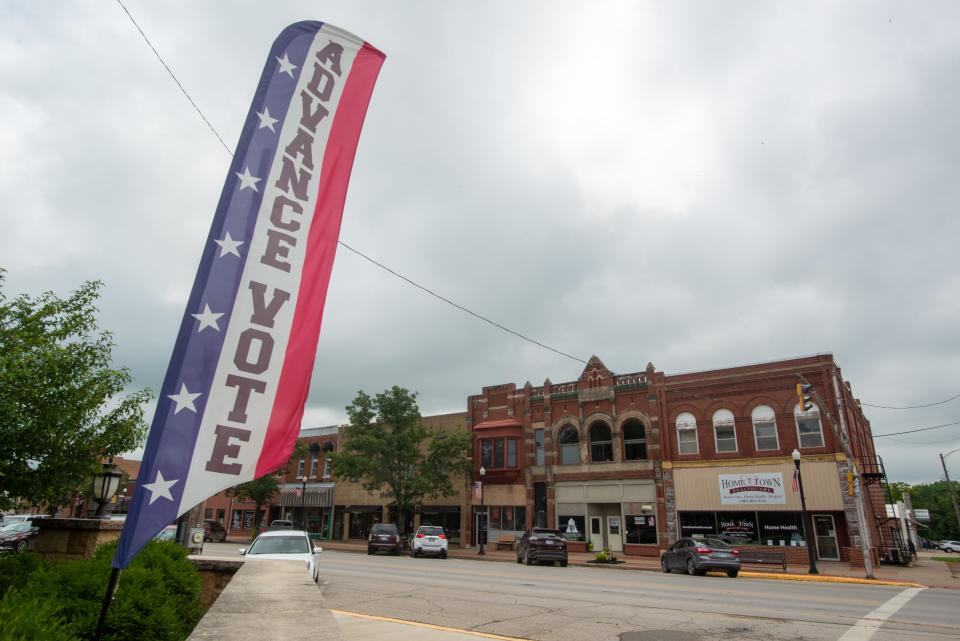Voting access advocates worry Kansas will lose the progress it has made
EDITOR'S NOTE: This page is part of a comprehensive guide to state voting rights across the U.S. and in Puerto Rico.
Kansas saw record turnout on Aug. 2, with nearly half of all registered voters heading to the polls to weigh in on, and ultimately defeat, a proposed abortion amendment to the state constitution.
But voting rights advocates in the state say it would be a mistake to interpret that flood of voters as a sign that casting a ballot is always easy.
They would point only as far as Wichita where a flood of voters prompted long lines and overwhelmed election officials on Tuesday. The final vote was cast in the state's largest city at 9:45 p.m., almost three hours after the polls closed.
Many of the state's Republicans argue a series of measures implemented in the last decade, such as requirements that voters produce a photo ID to vote, have helped Kansas strike a balance between election security and ensuring ease of access.
"I think it's easier to vote by far today than it was my first time when I voted," said Sen. Rob Olson, R-Olathe, who chairs the Senate committee that handles election bills.
Not everyone agrees.
"Until we're as close to 100% turnout that we can possibly get, reduce the barriers as much as we can and make it possible for turnout to get that high, then we aren't doing enough," Alejandro Rangel-Lopez, lead organizer for the New Frontiers Project, a group focused on civic engagement in southwest Kansas, said.
Kansas voter ID law still prompts debate
Kansas is in a unique spot when it comes to election administration.
The state gives some measure of flexibility to each of the 105 counties on how elections are run. Kansas is one of only a few states, for instance, that give county clerks the option to offer in-person, advanced voting on weekends.
Sometimes, however, advocates say that information isn't widely distributed to voters.
Rangel-Lopez noted times for advanced voting can often be inconsistent and information is not always easy to access beyond difficult-to-navigate county websites.
In Dodge City, for instance, the city had a second polling place, as part of an effort to rectify a standoff that drew national attention in 2018, where one of the largest cities in the region only had one place to vote.
But Rangel-Lopez noted that not all voters knew where to go, even those who had been registered for years.
"Folks just don't know where to get this information that should be at their fingertips, but they are unaware of it," he said.

During former Secretary of State Kris Kobach's tenure, Kansas became nationally notorious for its efforts to crack down on voter fraud, including a prolonged legal battle over an invalidated law to require proof of citizenship when left to vote.
The 2011 voter ID law, a move proponents say is designed to make it harder to commit voter fraud and mirrors how residents access other public services, remains on the books.
"Voter ID ensures the voter is an actual person and protects the integrity of your vote," Secretary of State Scott Schwab wrote in an April Capital-Journal op-ed. "It is a fundamental tool to ensure one vote equals one person."
But a 2017 report, compiled by the Kansas Advisory Committee to the U.S. Commission on Civil Rights, said it was unclear how many instances of fraud were prevented.
"The number of eligible voters turned away from the polls in Kansas due to a lack of required identification or a failure to provide documentary proof of citizenship may far exceed the number of documented cases of voter fraud," the report said.
Earlier this year, Gov. Laura Kelly signed a bill banning sanctuary cities in Kansas. As part of that, the legislation limited the issuance of municipal identification cards, which had been issued in Douglas County to help residents comply with the voter ID law — a strategy praised by experts to help ensure voters could still cast a ballot.
In Kansas, residents without a driver's license can obtain a free ID for voting purposes at the Kansas Division of Motor Vehicles. A resident can also obtain a birth certificate free of charge to prove their identity.
Still, advocates argue that those in nursing homes or assisted care may not be able to have help accessing the documents needed for an ID. Low-income residents may still be in a similar bind.
"Kansas certainly doesn't have the worst voter ID law," said Davis Hammet, executive director of Loud Light, a civic engagement group targeted at young people. "But those first couple of elections, it was a terrible and chaotic rollout. I mean, there are tons of people who didn't vote, who were unable to vote."
Kansas sees push to tighten mail voting, drop boxes
But Hammet said there is a second, parallel trajectory: Kansas officials have actually made it easier to vote in some respects in recent years.
In 2018, for instance, lawmakers voted to allow residents to drop off an advanced ballot at any polling place in a county by 7 p.m., along with the county election office, and allow it to be counted.
On at least two occasions, the Legislature voted to ensure residents have a chance to fix mistakes that would otherwise mean their ballot would go uncounted.
Preserving those gains, however, is what Hammet is most worried about.
"That idea of these kinds of incremental steps, all of a sudden goes out the window, and we spend every day fighting just absurd, insane conspiracy theories, that would just disenfranchise tons of people."
In recent years, legislators have been increasingly interested in tightening portions of the state's election laws, often with mixed success.
The principal rationale, proponents argue, is to continue to cut down on instances of voter fraud. Many echo rhetoric used by former President Donald Trump to assail election results in larger states, such as Wisconsin and Michigan.
Schwab's office has routinely pushed back on this rhetoric, arguing the existing requirements — such as voter ID — have protected Kansas elections.

And while Kobach aggressively went after those he accused of voter fraud, such reports have been few and far between more recently.
Since the state's voter fraud reporting portal was launched in December 2021, the Kansas secretary of state's office has received five inquiries regarding voter fraud, a spokesperson said, including two regarding the 2020 election. All were deemed to be non-fraudulent.
Nonetheless, lawmakers have considered changing the state's advanced voting law, which allows residents to request a mail ballot up until one week until an election. Legislators have not considered changing advanced in-person voting, which begins 15 days before an election.
Bills considered in each of the last two sessions would have ended the so-called three-day grace period. That allows advanced mail ballots postmarked by 7 p.m. on Election Day to be counted, provided they arrive at the county elections office by Friday afternoon, three days later.
"We are undermining confidence in our tallying procedures by allowing the ballots to keep trickling in over time," Rep. Charlotte Esau, R-Olathe, said during a House Elections Committee meeting in 2021.
Sen. Oletha Faust-Goodeau, D-Wichita, said the changes to mail voting would most squarely fall on the elderly, working-class residents and those who work third-shift jobs that would keep them from voting during business hours.
"My goal is to make sure we have safe elections and that everyone can cast their vote," she said on the Senate floor earlier this year.
Groups expect ‘election integrity’ push to continue in Statehouse
But it is not clear legislators have the support for such a move — a bill ending the three-day grace period was adversely reported by the House Elections Committee earlier this year, a move that effectively kills a bill.
And a separate bill, which would have sharply curbed the use of ballot drop boxes, died in negotiations between the two chambers after passing the Kansas Senate.
Rural lawmakers in particular, have expressed concerns about the idea given slow mail delivery in remote areas, as well as long drives to county seats.
"They keep getting voted down by coalitions of legislators who want to do what's best for their constituents," Caleb Smith, integrated voter engagement director for the advocacy group Kansas Appleseed, said.
That legislation is a response to concerns from some voters — fueled by baseless claims by Trump and others — that drop boxes are a vehicle for fraud.
Olson said his frustration stemmed from the lack of uniformity, with counties free to differ in their approach to drop boxes. Some don't use the receptacles, while Johnson County has eight.
This lack of consistency, he said, is what breeds mistrust — even though he maintains he has no problem with drop boxes themselves.
"I wish the secretary of state's office would have spent some time and put some policies together and said 'This is how the votes are going to be counted," he said. "And we're going to do it every day, or, or these are the policies to have drop boxes. ... There's just no fairness across the board."
Lawmakers have succeeded in passing laws to restrict how advanced ballots are collected, a move to prevent so-called ballot harvesting, which Republicans have said facilitates fraud.
Last year, legislators voted to limit the number of advance ballots an individual can bring to the polls on behalf of someone else. The same bill also restricts candidates from collecting another person's ballot.
That law is currently being challenged in court. Hammet said they are a sign that lawmakers are more broadly intent on sowing confusion and fear among voters.
"They make so many rules around so many small obscure things, and they make it very high crimes so that it becomes very intimidating to participate at all," he said.
Voting rights advocates have pushed for other measures that have been implemented in other states but are unlikely to become law in Kansas anytime soon.
That includes same-day voter registration, compared with the current law, where the deadline to register slams shut 20 days before an election.
Smith said the focus would instead be on holding the line.
"We do see another year or two of folks being just really interested in making sure that that election integrity sort of messaging stays front and center," he said.
Olson didn't commit to what election law changes he might take a look at in 2023 but said the issue would be one of many discussed in his committee.
"Who knows, maybe we'll have a great election year and people will be happy," he quipped.
Andrew Bahl is a senior statehouse reporter for the Topeka Capital-Journal. He can be reached at abahl@gannett.com or by phone at 443-979-6100.
This article originally appeared on Topeka Capital-Journal: Kansas' voting history a battle between security and ease of access

